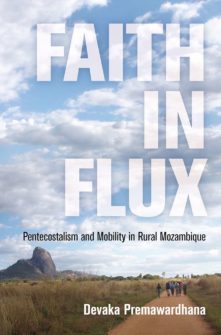 Devaka Premawardhana’s Faith in Flux: Pentecostalism and Mobility in Rural Mozambique is an ethnographic study of how the Makhuwa, a rural people from northern Mozambique, have experienced conversion from their traditional Makhuwa religion to Pentecostalism. Perhaps counterintuitively to western-educated scholars of religion and anthropology, it is also a study of how such conversion does not necessitate ceasing to engage in traditional Makhuwa religious practices, or preclude returning to them. This is counterintuitive to many scholars because anthropological studies of Pentecostalism have tended to treat conversion to Pentecostalism as an indication that one has made a decisive and irreversible break with the past. This account fails, however, to account for the virtue of mobility that is cultivated through Makhuwa practices. In attending to how Makhuwa organize space, tell their creation narratives, engage in rituals, and relate to the modern nation-state, Premawardhana is able to demonstrate that the Makhuwa are a traditionally mobile people. In other words, the Makhuwa are mobile not because they seek to evade the constraints of tradition, but precisely the opposite, because they are working within them. The arrival of Pentecostalism has certainly set Makhuwa faith in flux, but the potential disruption of this arrival is offset by Makhuwa faith in flux (a virtue that is also prized in Pentecostal practices, if not in the claims of its elite representatives). Conversion to Pentecostalism therefore need not be the beginning nor the end of a story for a Makhuwa person, but simply another chapter.
Devaka Premawardhana’s Faith in Flux: Pentecostalism and Mobility in Rural Mozambique is an ethnographic study of how the Makhuwa, a rural people from northern Mozambique, have experienced conversion from their traditional Makhuwa religion to Pentecostalism. Perhaps counterintuitively to western-educated scholars of religion and anthropology, it is also a study of how such conversion does not necessitate ceasing to engage in traditional Makhuwa religious practices, or preclude returning to them. This is counterintuitive to many scholars because anthropological studies of Pentecostalism have tended to treat conversion to Pentecostalism as an indication that one has made a decisive and irreversible break with the past. This account fails, however, to account for the virtue of mobility that is cultivated through Makhuwa practices. In attending to how Makhuwa organize space, tell their creation narratives, engage in rituals, and relate to the modern nation-state, Premawardhana is able to demonstrate that the Makhuwa are a traditionally mobile people. In other words, the Makhuwa are mobile not because they seek to evade the constraints of tradition, but precisely the opposite, because they are working within them. The arrival of Pentecostalism has certainly set Makhuwa faith in flux, but the potential disruption of this arrival is offset by Makhuwa faith in flux (a virtue that is also prized in Pentecostal practices, if not in the claims of its elite representatives). Conversion to Pentecostalism therefore need not be the beginning nor the end of a story for a Makhuwa person, but simply another chapter.
Premawardhana is able to see this aspect of Makhuwa tradition because he engages in an existential anthropological approach to the lived experiences of the Makhuwa themselves. What he finds through attending to such lived experiences is that the Makhuwa people with whom he lives and studies see the world through the lens of mobility; mobility is existential, or life-defining, for the Makhuwa (17). And it is this existential mobility that allows for the Makhuwa to move in and out of different traditions without anxiety. In seeking a one-time conversion event, Premawardhana suggests, anthropologists have betrayed a particular Christian understanding of conversion, one that indicates a desire on the part of the theorist to find something like Saint Augustine’s sudden conversion to orthodox Christianity from which he never looked back. While this trope has been secularized in modern anthropological work, its theological potency has remained. Through his existential approach, Premawardhana is able to bring to light a non-Christian theory of change and to push anthropologists to think more expansively about the categories they employ in their work.
The essays collected in this symposium reflect critically on the methodology and conclusions Premawardhana reaches in Faith in Flux. Ebenezer Obadare lauds Premawardhana’s argument in the book, but questions whether or not Premawardhana goes too far in privileging indigenous Makhuwa religion as a stabilizing tradition, even if that tradition is one that countenances change. Harri Englund questions whether or not Premawardhana’s focus on phenomenology to the exclusion of larger ideological structures risks obscuring inequalities that might be present among the Makhuwa. Laura Grillo pushes Premawardhana to reflect more on the gendered dynamics among the Makhuwa, as well as the gendered dynamics that shape Premawardhana’s own analysis. And finally, Robert Baum suggests that Premawardhana’s theory of conversion is one that improves upon an earlier theory of “reconversion” he put forward, and suggests that he will draw on Premawardhana’s insights in his future work on women prophets in post-colonial Senegal. In his response, Premawardhana reflects on the contributions that each of these scholars have made to his own thinking and engages with each of their critiques.
Through its focus on how the Makhuwa uniquely navigate religious, political, and social forces in modern Mozambique, Premawardhana’s book speaks to the ongoing need to balance thick descriptions of communities with reflection on the theoretical tools—which often contain particular Christian theological assumptions—scholars employ to understand them. This ongoing exchange between theory and ethnographic description is key to the Contending Modernities initiative (CM) to improve our understandings of secularism and religion in modernity. These terms, as Premawardhana reminds us, are not static, but must be understood as temporally, geographically, and socially contingent. CM, by focusing on geographical and social settings outside the Euro-American context, seeks to de-provincialize our discussions of religion, secularism, and modernity, and in doing so aid in efforts to decolonize the academic study of all three.

